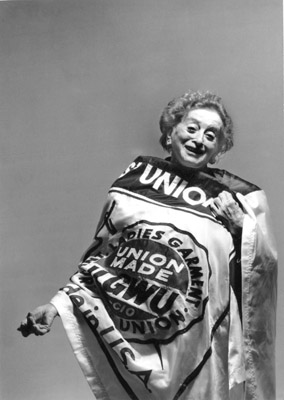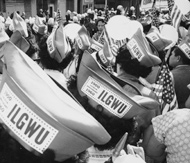

Highlights
Hall of Fame Induction

For Evelyn Dubrow, a prominent labor lobbyist, activism ran in the family. “Evy” was born May 6, 1911 in Passaic, New Jersey, to socialist parents who emigrated from Russia (Belarus). Her father was a carpenter and active union member, and after arriving in the United States in 1896, sent for Dubrow’s mother and older sister Mary. It was her sister Mary though, a suffragist arrested for picketing the White House, who especially influenced Dubrow’s interest in labor and liberal causes.
Dubrow received a degree in journalism from New York University, and in the mid-1930s launched her career doing backup work for a friend who was a reporter at the Paterson Morning Call. She later began editing and writing an English section for The Citizen, an Italian-American weekly, and joined the American Newspaper Guild (ANG) in 1935, becoming secretary of the New Jersey organization from 1943 to 1946. Becoming interested in politics and political campaigns, Dubrow was hired by Police Commissioner Don Regner to do his press work and soon earned the nickname “Dynamite.” In 1937, Dubrow became an assistant secretary for the Textile Worker’s Organizing Committee. During her time there, she worked as an organizer and assistant to the Assistant Regional Director for the Textile Workers in New Jersey, Irving Abramson. After organizing young salesgirls in a Passaic department store, Dubrow orchestrated a successful sit-down strike after management refused to recognize the salesgirls’ intent to unionize. Her previous experience with New Jersey politics came in handy when Commissioner Regner arrived to suppress the strike only to learn it was “Dynamite” leading the charge and a contract was soon signed. When Abramson was elected president, Dubrow became his chief assistant and edited the CIO newspaper. Throughout the 1940s, Dubrow held many positions including education director of the New Jersey Textile Workers Union (1940-1942), and secretary to the president of the New Jersey Industrial Union Council (1943) before becoming assistant to the president (1944). Dubrow also aided in the establishment of labor and industrial schools, including Rutgers University in 1947. Shortly after, Dubrow began to help organize the Americans for Democratic Action (ADA) and became New York State director for the ADA in 1948 where she also took part in political campaigning.
Dubrow’s early experience in lobbying the New Jersey legislature proved useful when in 1956, she went to work for the International Ladies’ Garment Workers’ Union (ILGWU) as executive secretary of the Political Department. ILGWU President David Dubinsky believed it was important for the union to have a voice in Washington, D.C. and felt Dubrow was the right one to represent all of the “girl” members. So at the president’s behest and after only six months on the job, in October of 1956, Dubrow headed to D.C. where she would become a fixture on Capitol Hill for the next forty years. In 1961 she became the legislative representative for the ILGWU and elected a vice president of the union in 1977. While the voice for the garment workers and members of her union, throughout her career she also became a formidable voice for social legislation as well as labor. During her time in Washington, Dubrow wore out many pairs of shoes as she covered ground with such social issues as the minimum wage, civil rights, voting rights, occupational safety and health, health care reform, family and medical leave, fair trade, and the improvement of labor conditions for working families. Dubrow was very active in associations; a founding member of the National Consumers Federation of America, vice chairman of the Labor Advisory Council Office of Economic Opportunity, vice president of the Coalition of Trade Union Women and member of many organizations from the National Consumers League, the National Fair Representation Committee, New Jersey State Education Advisory Committee, and American Labor Education Service.
Her ubiquity in Washington was evidenced through the stories of Dubrow’s early babysitting activities with young charges including former Vice President Al Gore and Senator Christopher J. Dodd. Her respect in Washington was evidenced by the assigning of a doorkeepers’ chair outside the House of Representatives chambers by then Speaker Thomas P. “Tip” O’Neill so she would not have to stand all day as she waited to catch Representatives entering and exiting the House. Dubrow’s job as Legislative Representative and Executive Secretary of the Political Department of the ILGWU continued after the union's merger with the Amalgamated Clothing and Textile Workers of America in 1995 that created the Union of Needletrades, Industrial, and Textile Employees (UNITE). She finally retired in 1997 and became Special Assistant to the then President of UNITE, Jay Mazur. In August of 1999, Dubrow was one of ten individuals, including former Presidents Ford and Carter, awarded the Presidential Medal of Freedom by President Clinton. Evelyn Dubrow passed away on June 20, 2006 at the age of 95.
Evelyn Dubrow will be inducted into the Labor's International Hall of Fame on May 16, 2013 in a ceremony in New York City. Also to be inducted are Viola Liuzzo and Anna Klobuchar-Clemenc. For more information on the work and life of Dubrow, visit the Kheel Center to read her papers and view her photograph collection.


